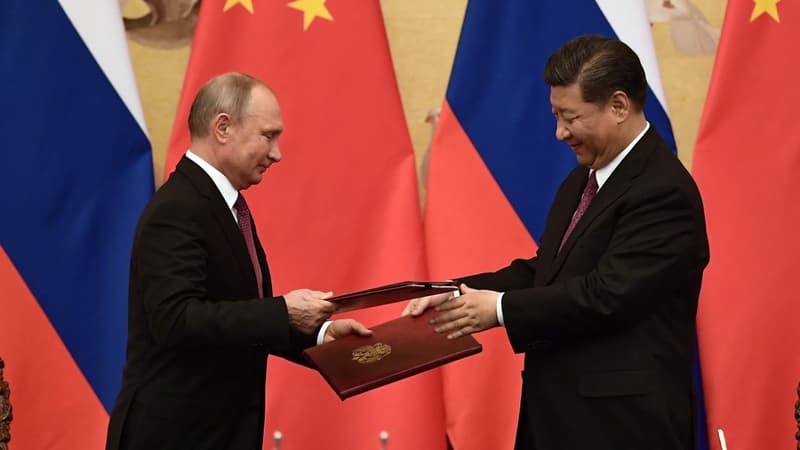Emmanuel Macron’s observation is extremely critical. Last Wednesday, during his speech to the United Nations in New York, the President of the Republic had insisted that Vladimir Putin’s Russia had been “increasingly isolated” since the beginning of the invasion of Ukraine by Moscow on 24 february. “Today no one understands the decisions that Russia makes,” he also attacked.
During that same incisive speech, Emmanuel Macron had also launched an appeal to all the countries “that have remained in a form of neutrality with respect to this war” to take a firm position against the invasion, and thus avoid a new partition. of the world. by not opposing Western countries supporting Kyiv with financial sanctions against Moscow and deliveries of military equipment.
Chinese and Indian warnings
Just last Wednesday, shortly after Vladimir Putin spoke during which he announced a partial mobilization of 300,000 men, several nations that had remained in the background since the start of the conflict showed their disapproval of the course of the Ukrainian conflict. Thus, China called for a “ceasefire through dialogue and consultation” while the Indian Prime Minister, Narendra Modi, recalled that the moment “was not for war”.
The beginning of a diplomatic change for these two countries, historically close to Moscow? Not directly, tells BFMTV.com Arnaud Dubien, director of the Franco-Russian Observatory, who reminds however that Beijing “has no interest in a strategic defeat of Russia.”
“This is not about letting go of India and China, that is what you would like to believe in the West. But his position is not very comfortable. Putin has said that he wants to end the war quickly and they are unpleasantly surprised, deep down. Russia may be weaker than they thought,” he adds.
Above all, the objectives of these two countries are far from military considerations. As BFMTV foreign policy columnist Patrick Sauce reminds us, “We shouldn’t take the Chinese and Indians for philanthropists who would say to themselves ‘let’s drop a flag for peace’.” For him, these two powers “not completely diverted from Russia, but they are beginning to warn more and more that a solution will have to be found”, although they have not positioned themselves in favor of Ukraine either.
“It poses economic problems for them, but also reputational ones since being associated with Russia today is no longer difficult. There is no position against Russia but it is a sign that the war must end or the path is not taken”, completes Sylvie Bermann, former French ambassador to Russia, on our antenna.
From a strictly economic point of view, Beijing cannot afford to further alienate the United States, with which tensions over Taiwan are high, and the West. A balance to be found with the words of the Chinese leader Xi Jinping, who last February before the invasion, spoke of “unlimited friendship” with Moscow.
The former USSR plays with balance
On the more local scene, too, support is drying up, even among countries of the former Soviet bloc, which are often seen as “vassal states” under Moscow’s control. Thus, neighboring Kazakhstan has ruled out any involvement in the conflict and refuses to send soldiers. The country’s new strongman, Kassym-Jomart Tokayev, had also warned that he would not recognize the new republics annexed by Russia, where highly criticized referendums were being held.
“There is water in the gas, Kazakhstan has bothered the Russians for a long time. We feel in the Kremlin a form of ingratitude, even disloyalty. What we hear here is: ‘we have saved the day in early January and they are reluctant to help us'” adds Arnaud Dubien.
Indeed, the position adopted by this young State, which had benefited from Russian aid to “tame” the demonstrations that took place at the beginning of the year in the main cities of the country due to the increase in gas prices, is strong. Due to his membership in the Collective Security Treaty Organization (CSTO), this same Tokayev had asked the Russian military to quell the riots with blood. This Tuesday, the Kazakh president had again distanced himself by assuring that his country will protect the Russians who flee to his country to escape the ongoing military mobilization.
For Kazakhstan, as for Uzbekistan, which has also shown signs of distancing itself from the Kremlin, the risks are multiple. In a society in full flux after long years of dictatorship, governments want to turn to the West, emancipate themselves, without forgetting the Russian influence that remains strong there economically but also socially.
“The Russians sent signals of discontent by cutting off Kazakhstan’s crude exports that passed through the CPC tube in the spring,” says Arnaud Dubien, as a reminder of the power that Moscow still exercises in the region.
allies of circumstance
Who can Vladimir Putin’s Russia still count on, even though discontent is growing stronger on its territory? From a political point of view, and in terms of support for the Ukrainian conflict, the Kremlin can only count on the unwavering support of neighboring Belarus, which has become a vassal state in its own right.
Yet here, too, the first signs of disagreement are visible. President Alexander Lukashenko has refuted any mobilization in his country and, last July, he called for an end to the conflict to avoid a “nuclear war”.
If the diplomatic and political future on an international scale seems blocked for Vladimir Putin, Russia still seems to have a leading role and an important weight on an economic level.
“If the oil flows no longer go to Europe, they will go to other markets: Asia, Africa, Saudi Arabia, etc. We have already seen this since the EU announced that it wanted to introduce an embargo on imports of Russian crude from December 5. “, adds Arnaud Dubien to BFMTV.com.
According to figures obtained by The expressSince the start of the Ukrainian conflict, exports of fossil fuels, including crude oil, have brought Russia almost €168 billion.
Source: BFM TV


